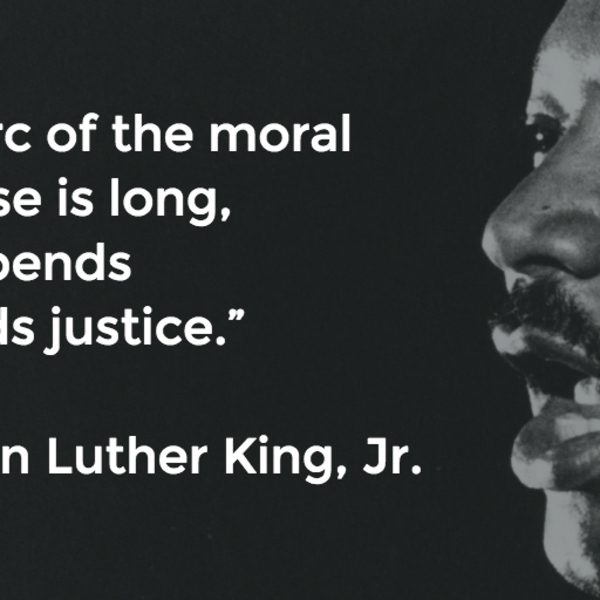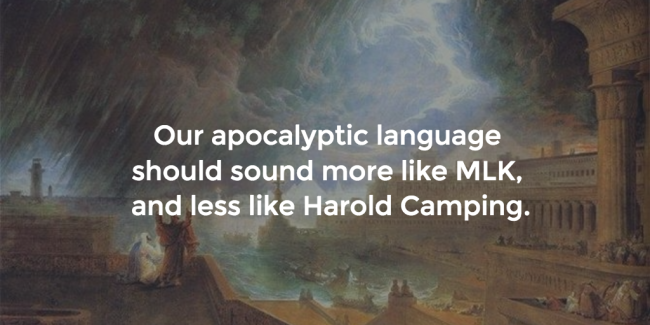A Better Apocalypse

On May 21, 2011, I was sitting in a steel-roofed building as a powerful storm pounded down outside.
This is the day that Harold Camping had said the world would end.
After decades of bible study, he had become so convinced of this that he gathered thousands of followers, many of whom sacrificed possessions, jobs, and (in some cases) homes, to spread the message via billboards and radio across the country that this was humanity’s last chance — this was history’s last call.
And as we sat there with the building shaking beneath the storm, some of us joked, and maybe some of us were a bit nervous, about whether there might be something to it after all.
But of course, the world didn’t end. And the next day came, and Harold Camping went back to his studies, and his followers went back to their homes and their jobs and their bills, and to trying to make sense of living in a world that stubbornly refused to quit.
This isn’t the first time something like this has happened. The history of the West is in some ways the history of Christianity, and the history of Christianity, according to Albert Schweitzer, is the history of the delay of the Parousia, the continual disappointment of apocalyptic hopes, the failure of apocalyptic expectations.
Over and over, charismatic prophets and preachers have led their people into the wilderness to await the end. And over and over, they have been disappointed and disillusioned.
But what’s remarkable about all of these prophesied apocalypses is how profoundly non-historical they are.
What I mean is that they do not arise from social, or economic, political, or ecological issues. They do not arise from human choice or action. They draw a firm line, and declare that here history ends, and something else begins, that here everything you’ve known and worked for gets discarded, and here, something else takes its place. The line is so firm that nothing carries over, nothing is preserved.
It’s no surprise then, if those who have been influenced by this outlook, even when they didn’t leave their homes or jobs behind, have often found themselves losing interest in art, in science, in technology, in the ongoing struggle of the human race.
After all, if God doesn’t care about these things, why should we?
I’m convinced that this is a contributing factor to the growth of secularism in our world. If the most intensely religious people find themselves no longer interested in the life of the human race, then it will be the secular who will inherit the earth.
But there is another form of apocalyptic outlook, one that draws from a much deeper source than that practiced by Harold Camping and those like him; one that grew organically from the worldview of the ancient Jews.
The Jews believed that their God was intimately involved in the created order, and as such, his attributes — things like truth, justice, and freedom — became the primary factors in human history. They were always rising, always advancing, always moving forward, like an incoming tide rising up on the shoreline of the world.
But they believed this could be resisted. Like a tide or a flood, you could build barricades and barriers and walls to hold the water back. Empires could arise, Emperors could come to power, to kill and enslave thousands and tens of thousands, to the point where their power seemed not only inevitable but unstoppable.
But the Jewish outlook said that this could not last forever. A time would come when the rising force and weight of justice would finally overwhelm the emperors and empires, sweeping over them and bringing them down with a mighty crash.
This was the apocalyptic moment, the turning point in history, and the more intensely the power structures had resisted the force of justice, the more cataclysmic would be their ultimate undoing.
They saw this happening in their primal narrative, the Exodus. The Jews had been slaves in Egypt, crying out for relief from their oppression, and Pharoah had set his entire might and power against them, to ensure that their cries for freedom and independence were not achieved.
And for a while, the Jewish cause seemed hopeless, and futile, and foolish. But as the Exodus story tells it, even the power of the almighty Pharoah ultimately fell beneath the rising tide of freedom.
This story became projected out on the world, the lens through which they saw the Babylonian Empire, the Roman Empire, and every other violent and brutal regime in history. The prophets would rise up, and use what the scholars call apocalyptic language — just as we use poetic language in our songs to highlight the dramatic significance of small romantic events, they used poetic language to highlight the incredible human significance of these moments in history. And so they spoke of the stars falling from the heavens, the sun refusing to give its light, the moon going dark, the rivers running red — calling back to the Exodus story, to the plagues on Egypt — to let their hearers know that although these empires seemed unstoppable, that ultimately this was just another Pharoah, just another Egypt, that would not have the final world.
And so the Jews didn’t see one apocalypse at the end of history, but many scattered throughout it — everywhere that good and evil met in conflict, and good, sometimes through prolonged and painful struggle, succeeded, this was a moment when the truth broke through, when the nature of reality was revealed, freedom flowed forth, and the arc of the universe could be seen.
And far from drawing them out of the world, this apocalyptic viewpoint drew them more deeply into it. If truth and justice and freedom were always rising, then one could have the courage to take a stand even when it seemed hopeless, (and tell the truth, even in a world of darkness), knowing that your efforts were never wasted, that your struggle was not in vain.
But they also saw the profound significance of human action. Because history was not predestined, but was incredibly contingent — every crisis needed a small group of people to become a channel, a small hole in the wall, through which freedom and justice could begin to pour.
And so, drawing from this powerful outlook on the world, the Jewish people stood for a level of human dignity and significance unprecedented in ancient times.
But this isn’t just something that happened in ancient history. It’s something that has had an impact much closer to home, in recent American history, in the person of Dr Martin Luther King jr.
Martin Luther King grew up in an environment saturated with the language and viewpoint of the Jewish prophets. And so, when he began to envision and call into being a better future, he drew upon their words and their outlook to highlight the incredible significance of that moment in history, the importance of individuals choosing to stand on the side of freedom, and the profound consequences of ignoring the voices of the oppressed:
The arc of the universe is long, but it bends towards justice
And far from drawing people out of the world with his prophecies of a better day, his words drew people more deeply into engagement with their world and their moment in history.
As spiritually-oriented people, I think one of the most significant things we have to offer is a better way of looking at the future. And we have choices — choices in how we talk about it, choices in how we portray it.
One of those choices is an apocalyptic outlook that, throughout history, has led to disappointment and disillusionment and despair.
Another of those choices is an apocalyptic outlook that draws from the deepest parts of our religious heritage, and which for thousands of years, has inspired people to some of the most profound acts of honesty, courage, and love, the world has ever known.
